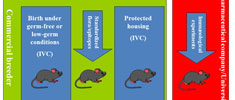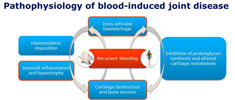Laboratory Animal Science and Welfare

Through animal models we aim for a better understanding of inflammatory-metabolic human diseases (such as diabetes, atherosclerosis, and obesity) and psychiatric diseases (such as anxiety, depression, and schizophrenia).
We work with refinement of animal models with main focus on the impact of environmental factors, such as diet, gut microbiota and housing on model expression.
Our vision is to improve animal welfare as well as to reduce variation and increase precision in animal studies.
 Effects of various forms of environmental enrichment in laboratory rodents: A variety of enrichment items and cage modifications for esp. laboratory rodents.
Effects of various forms of environmental enrichment in laboratory rodents: A variety of enrichment items and cage modifications for esp. laboratory rodents.
 Development and refinement of behavioural tests for use in neuroscience & refinement of behavioural tests: During on-going projects within this field, we aim to provide advanced behavioural tests based on cognitively demanding natural behaviours.
Development and refinement of behavioural tests for use in neuroscience & refinement of behavioural tests: During on-going projects within this field, we aim to provide advanced behavioural tests based on cognitively demanding natural behaviours.
 The link between external factors : (diet, drug-administration), gut microbiota and animal models within metabolism, inflammation and neurobiology.
The link between external factors : (diet, drug-administration), gut microbiota and animal models within metabolism, inflammation and neurobiology.
 Optimising and refining laboratory techniques: in experimental animal research such as blood sampling with focus on animal welfare.
Optimising and refining laboratory techniques: in experimental animal research such as blood sampling with focus on animal welfare.
 Mice with a tailor-made gut microbiota : for modelling specific diseases, such as type1 and type 2 diabetes, obesity, inflammatory bowel disease and others.
Mice with a tailor-made gut microbiota : for modelling specific diseases, such as type1 and type 2 diabetes, obesity, inflammatory bowel disease and others.
 Characterizing new rodent knockout models: within haemostasis and inflammation.
Characterizing new rodent knockout models: within haemostasis and inflammation.
Read more about animals used for scientific research in our thematic booklet in Danish: Dyremodeller - mod en sundere fremtid.
Contact
The research group
LabVet Europe
The research group is responsible for the post-graduate program for laboratory animal veterinarians LabVet Europe

